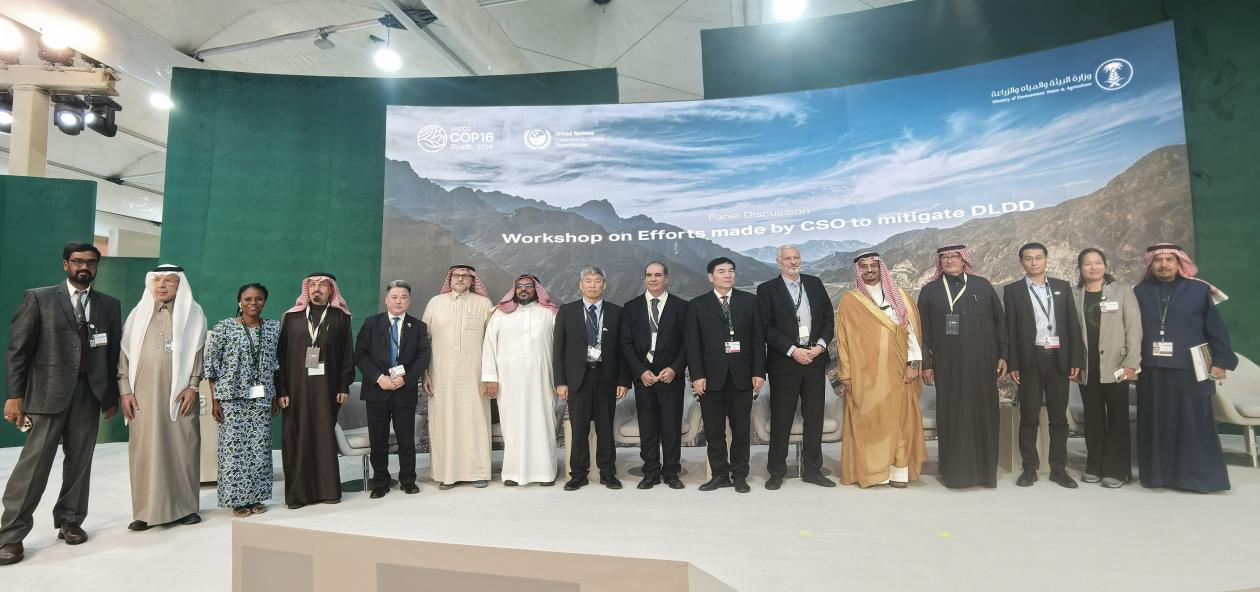On December 4, 2024, during the 16th session of the Conference of the Parties (COP16) of the United Nations Convention to Combat Desertification (UNCCD), held in Riyadh, Saudi Arabia, the Association for Combating Desertification of the Alliance of National and International Science Organizations for the Belt and Road Regions (ANSO-ACD), in collaboration with the Center of Excellence in Environmental Studies (CEES) at King Abdulaziz University (KAU) and the Center for International Forestry Research and World Agroforestry (CIFOR-ICRAF), co-hosted a side event titled “Workshop on Efforts Made by CSOs to Mitigate DLDD” (Desertification, Land Degradation, and Drought). The event attracted more than 120 participants from around the world.
As part of the 3rd Taklamakan Desert Forum, ANSO-ACD had previously introduced an Entrepreneurial Partner Program, which aims to foster dialogue and collaboration between leading enterprises and research institutions in the field of desertification prevention and control. Building on this cooperative framework, the UNCCD COP16 side event focused on addressing the scientific and technological needs of the Saudi Green Initiative, guided by the principles of equality, mutual benefit, and reciprocity.
Participants, including scientists and entrepreneurs, engaged in in-depth scientific exchanges and technical discussions on capacity-building efforts in key areas such as; sustainable water resource utilization, desertification monitoring and assessment, biological and mechanical measures to combat desertification, the introduction and cultivation of drought-resistant plants for arid landscapes, and research and development in desert environments.
This side event comprehensively showcased the efforts and achievements of global civil society organizations (CSOs) in mitigating desertification, land degradation, and drought. It served as a platform for stakeholders to exchange experiences, share technologies, and deepen cooperation. By emphasizing green barrier construction, ecological restoration technologies, and sustainable development strategies, the event further promoted international collaboration and innovation in desertification prevention and control. Notably, experimental and demonstration projects on desert governance and desertification prevention conducted by Chinese experts globally, as well as advanced engineering technologies and specialized automation and semi-automation machinery independently developed by Chinese enterprises, received widespread attention and recognition from participants. These contributions have provided significant technical support and practical experience to global efforts in combating desertification.
Prof. Mohamed Orif from KAU delivered the welcome speech on behalf of the KAU President. Special reports were presented by: Prof. LEI Jiaqiang, Director of ANSO-ACD and a researcher at the Xinjiang Institute of Ecology and Geography (XIEG) of the Chinese Academy of Sciences; Prof. Mohamed Elfleet from KAU; Dr. Peter Gilruth, Senior Consultant at ICRAF; Dr. ZHU Jinlei, Professor at the Green Great Wall Research Institute of the Chinese Academy of Forestry, and Mr. LIU Tao, Chairman of Sinoway Forest Technology Co.
Following the event, several international organizations held in-depth discussions with Chinese representatives, resulting in preliminary agreements for future cooperation. Additionally, representatives of Chinese enterprises and attendees from other countries explored opportunities to apply Chinese technologies in diverse international contexts.
This side event provided a significant platform to showcase China’s innovative approaches and advanced technologies in desertification prevention and control, underscoring the country’s contributions to global efforts in this field. It also highlighted the potential for deeper international collaboration, reinforcing China’s role as a global leader in combating desertification and promoting sustainable development.
Contributors: ANSO-ACD,QIAO Jianfang and Alishir Kurban

